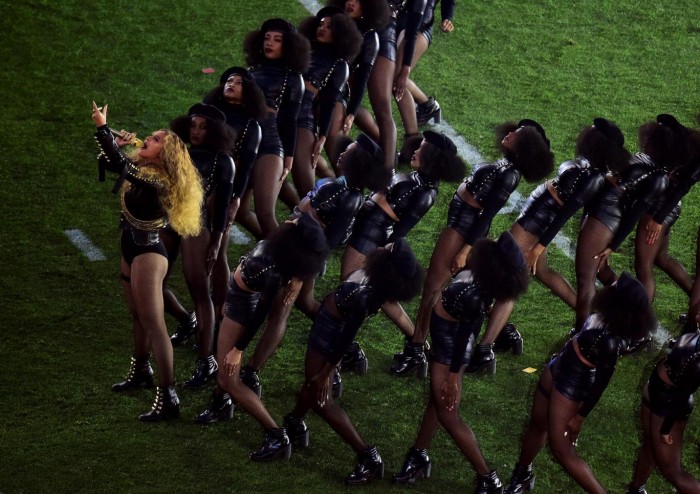Between Beyoncé’s Super Bowl show, Kendrick Lamar’s Grammy performance, and Kanye West’s assault on reason, Black Power is igniting every pop culture barricade in sight in defiance of convention.
When Beyoncé released “Formation,” fans expecting another version of the club-ready recycled trap hit “7/11” were left distraught. Gone was the gif-ready, pointlessly sexualized Bey. Instead, they heard Beyoncé, the “Texas bama” representation of Southern blackness. In the video, the only white people shown are police raising hands in defeat to a breakdancing black boy as Louisiana bounce artist Big Freedia say “I like cornbread and collard greens, bitch.” Among images of ravaged Louisiana, Creole culture, and police brutality, Beyoncé intensifies her already ferocious self-strengthening aura by going deeper inside her blackness.
Set in contrast to a canned Coldplay performance at the Super Bowl, “Formation” showed why Coldplay needs to play songs from over a decade ago and Beyoncé can release a song at random and have the world eating Red Lobster with her. Her Blank Panther uniform only stressed that “BELIEVE IN LOVE” only works when thousands are forced to hold up placards on TV.
A week later at the Grammys, as other artists were playing tribute songs and pop hits, Lamar came in, no compromises, guns blazing with a medley of the self-loathing, dystopian “The Blacker the Berry,” the determined anthem “Alright,” and a searing unreleased verse on the black abuse and white brutality.
On “Blacker the Berry,” Lamar reclaimed black culture: “Vandalize my perception but can’t take style from me.” He then throttled his audience, shoving self-determination down their throats, “As we proceed to give you what you need.” With the subsequent “trap our bodies but can’t lock our minds” then “lock our bodies but can’t trap our minds” chants, Kendrick shattered the traps and locks of institutionalized racism. On the call to arms of “Alright,” Lamar sermonized the audience on perseverance on a stage of fire. For the final song, he flew into a frenzied verse on the destruction caused by the Trayvon Martin murder, accelerating into a final defiant Compton-inscribed image of Africa as the lights went out.
Throughout his performance, Lamar conjured up and fused together Nat Turner, Bobby Seale, the Watts Riots, the Rodney King Riots, and Trayvon Martin. While Taylor Swift won the Album of the Year over him and brought the Grammys back to 1989, Kendrick brought the world back to 2012, 1992, 1965, 1831, then finally into the time-transcending reminder that modern Black Power is a “conversation for the entire nation. This is bigger than us.”
If Kendrick is the polemicist, Kanye is the paragon and impresario of new black power. On his new, densely-cluttered, densely-combative (unfinished?) album, The Life of Pablo (TLOP), Kanye fires at everything from Nike to Taylor Swift to greed to himself. TLOP, as a self-proclaimed gospel “album of life,” features a heavy dose of iconic samples ranging from Nina Simone to Ghostface Killa to a new protégé Desiigner to the most self-reflexive of all, himself. Climbing to fame through his production skills, Kanye will however always have a stronger musical ear than a musical voice. And he knows it. As such, Kanye takes it upon himself to make music for and by his community. On TLOP, a slew of notable and rising rappers are featured: Chance the Rapper, Travi$ Scott, Young Thug, and Ty Dolla $ign. Yet, affirming the power and scope that Kanye holds, he also features the youngest ever Pulitzer prize-winning composer Caroline Shaw on a track with Frank Ocean.
There is so much positive energy right now … Let’s stay on this Ultra Light Beam…
— KANYE WEST (@kanyewest) February 17, 2016
In the most unconventional of album rollouts, Kanye captivated the world with a series of legal-pad tracklists, an otherworldly—perhaps totalitarian—fashion show, a Saturday Night Live-esauqe tour de force, all buttressed by Twitter rants ranging from “Don’t tell me Lebron had a bad game. What yo jump shot look like???” to “There is so much positive energy right now … Let’s stay on this Ultra Light Beam…” That Kanye can take the world hostage over an unfinished album and mildly crazy twitter musings marks the cultural territory gained by the new Black Power Movement.
It is then no surprise then that all these artists have royal epithets. A new, black, cultural power is deriving from Queen Bey, King Kendrick, and Yeezus. We’re just here to bear witness.








